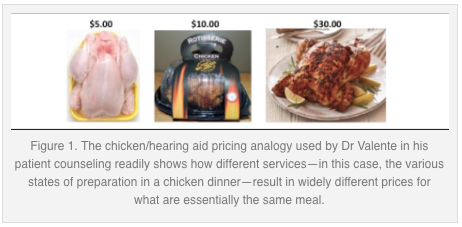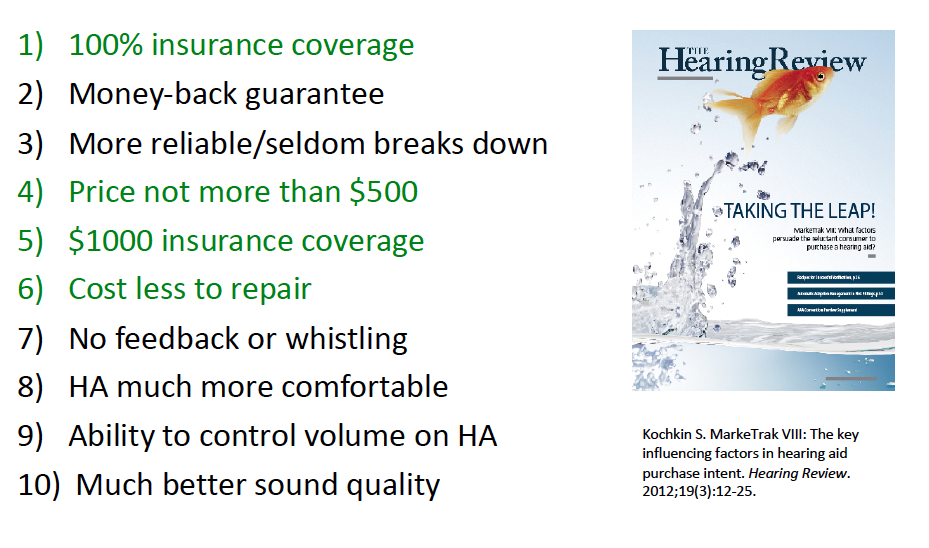Hearing care professionals (HCPs) deal with this question all the time: Why do hearing aids have to cost so much? Of course, there are many reasons commonly cited: the research and development that goes into advanced hearing aids, the associated professional investments and service costs, the relatively small number of hearing aids manufactured, hearing aid returns, and more.
According to HearingTracker.com, the average price of a professionally fitted hearing aid is $2372, usually equating to grand total of around $4500 for a binaural fitting. More recently, personal sound amplification products (PSAPs) and DIY-type amplification devices have made price sensitivity an even larger issue, as these types of amplification devices can cost anywhere $50 to $2500. Additionally, it’s possible to purchase—without the extremely important fitting services—brand name hearing aids online for about one-half or one-third of what a professional will charge. (Note: While it’s certainly possible to do this, you’ll need a professional to fit that aid, and there is a good chance they’ll end up charging you more than if you originally bought it from them!)
How can this be? To better illustrate why hearing aids dispensed by hearing care professionals are more expensive than if purchased online or as an OTC device, renown clinician-researcher Michael Valente, PhD, of Washington University in St Louis, would sometimes show a patient a picture of three ways to buy a chicken dinner: 1) A frozen chicken in the grocery store sold at $5; 2) the same chicken cooked and sold in a grocery store for $10; and 3) the same chicken cooked and prepared in a nice restaurant for $30 (Figure 1). Dr Valente’s point: there is value and benefit in a hearing aid fit with best practices, but that value and benefit comes with necessary associated costs.

What the Data Says About Price as an Obstacle to Hearing Aid Purchase
Numerous studies and surveys show that hearing aid price, while certainly not the only factor, remains a major obstacle in obtaining appropriate hearing care. A 2011 study by Fischer et al showed that the two main reasons for not obtaining a hearing aid were cost (overall 27% of respondents) and not needing an aid (26%). MarkeTrak VIII (MT8) published in the March 2012 Hearing Review presented a comprehensive analysis of hearing aid purchase intent and the factors that might lead a hearing aid non-user to consider purchasing a device. As shown in Figure 2, MT8 found that, of the top-10 factors that would convince a prospective consumer to purchase a hearing aid, 4 of those items related to cost in some way:

Similarly, a July 2020 survey by SeniorLiving.org cites cost (38.2% of survey respondents) as the second most important reason for not adopting hearing aids (the number-one reason was “Can manage without one” with 56.9% of respondents). The other significant factors were: “Not prescribed” (24.5%); “Doctor deemed unnecessary” (16.7%); “Don’t want one” (15.9%); “Uncomfortable” (10.8%); and “Other assistive technology” (1.0%). As the survey stated, “While many products have been developed to help mitigate hearing loss, most prominently hearing aids, many of these devices are quite expensive, and there’s no single standard across the country for whether hearing aids are covered by health insurance.”
Hearing Care Practices Increasingly Respond with Financing and Device Options
Most hearing care professionals would agree that cost should never be a reason to forgo treatment for a hearing loss. Increasingly, hearing aid financing is playing significantly greater role in the patient journey. A hearing care practice that provides the option of consistent, low monthly payment options for a hearing aid over an extended period is a boon to many consumers. A number of different companies offer a wide range of financing options designed to accommodate the consumer’s individual needs, including low monthly payments with a fixed Annual Percentage Rate (APR). Patients can also turn to financing for some of our field’s incredibly effective assistive devices—like remote microphones, loop systems, and alarm/alerting devices—which may be underutilized in the armamentarium of HCPs due to cost issues.
Today, more hearing care professionals are also carrying a wider selection of hearing aid products, including more economy and basic-level hearing aids, and unbundling their prices and/or offering optional service packages to separate and reduce the “device cost”—bringing them into more favorable pricing when compared with Big Box and online pricing. A 2017 Hearing Review dispenser survey pointed to a fairly wide range of average unit prices—from about $900 to $3,100—for the various technology levels in a wide range of HCP practice settings (ie, from private practice to mass merchandisers).
If you are concerned about the affordability of a hearing aid, you should first check to see if your insurance company offers any coverage for hearing aids. Another thing is to consider are lower-priced or more basic-level hearing aids from a professional. Studies have shown that—if you’re fitted correctly by a hearing care professional who uses best practices—you should hear just as well with a basic hearing aid as with the most expensive one. You almost certainly won’t get all the Bluetooth connectivity, on-demand verbal access to Siri/Alexa, rechargeability, and other bells-and-whistles, but a well-fit lower-technology hearing aid will provide very close the same benefit as a top-of-the-line model.
Some hearing care practices have even started carrying PSAP/DIY amplification (ie, soon to be OTC hearing aids) with various options for consumers to be fitted appropriately with the device and/or then charged for any extra follow-up visits. In some cases, the HCP also provides the option of applying all or part of the device cost towards the purchase of a traditional hearing aid at a later date.
The bottom line is that financing options—and, perhaps in some cases, lower-priced hearing solutions—can help you get the hearing devices you need—even if you’re on a tight budget. Here are some of the most-common hearing aid financing companies for consumers with links to their websites for more information. Most of these companies can supply you with a name of a local hearing care professionals who offers their financing plans:

Recent Comments